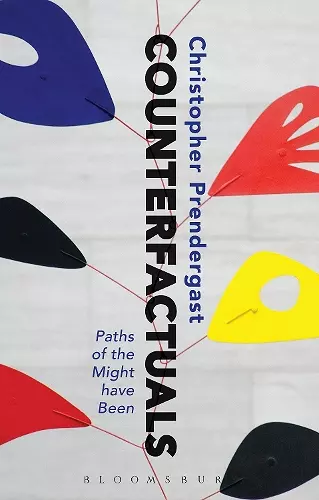Counterfactuals
Paths of the Might have Been
Christopher Prendergast author
Format:Paperback
Publisher:Bloomsbury Publishing PLC
Published:4th Apr '19
Currently unavailable, and unfortunately no date known when it will be back

We all use counterfactuals whether we are aware of it or not. But what are they? Counterfactuals introduces and explores both the history of the idea and contemporary use of counterfactuals in our everyday lives.
What are counterfactuals and what is their point? In many cases, none at all. It may be true that if kangaroos didn’t have tails, they would fall over, but they do have tails and if they didn’t they wouldn’t be kangaroos (or would they?). This is the sort of thing that can give counterfactuals a bad name, as inhabitants of a La La Land of the mind. On the other hand, counterfactuals do useful service across a broad range of disciplines in both the sciences and the humanities, including philosophy, history, cosmology, biology, cognitive psychology, jurisprudence, economics, art history, literary theory. They are also richly, albeit sometimes treacherously, present in the everyday human realm of how our lives are both imagined and lived: in the ‘crossroads’ scenario of decision-making, the place of regret in retrospective assessments of paths taken and not taken, and, at the outer limit, as the wish not to have been born.
Christopher Prendergast take us on a dizzying exploratory journey through some of these intellectual and human landscapes, mobilizing a wide range of reference from antiquity to the present, and sustained by the belief that, whether as help or hindrance, and with many variations across cultures, counterfactual thinking and imagining are fundamental to what it is to be human.
Here’s a counterfactual: if this book were less good, it would be easier to review. It’s quite rare to come across a book like this which is, quite simply, for the humanities. If we imagine a world where this book had no audience, where, say, the meanings of Petrarch’s climb and Ignatius’ indecision were forgotten, it would be a much colder and less wise one. * Times Higher Education *
[These] books are sophisticated straws in a rising wind. * Times Literary Supplement (joint-reviewed with Things That Didin't Happen) *
[These books] add up to more than the sum of two deeply meditated, extensively researched projects ... [They] invite more interesting questions than I can count. * London Review of Books (joint-reviewed with Telling It Like It Wasn't) *
Christopher Prendergast’s wide-ranging and philosophically informed investigation of counterfactuals is a revelation. Counterfactual conjectures, we learn, wend their way through centuries of Western thought on numerous topics: the vagaries of chance, the mysteries of time, and the fragility of personal identity. They link metaphysical speculation to utopian longing and the pain of personal regret. Prendergast’s encounters with them reveal both their ubiquity and their strangeness. -- Catherine Gallagher, Emerita Eggers Professor of English Literature, University of California Berkeley, USA
Prendergast uses the rich idea of counterfactuals as a point of departure for a deft exploration of key works of literature and philosophy. This is an intellectually adventurous and highly stimulating book. -- Andrew Huddleston, Senior Lecturer in Philosophy, Birkbeck, University of London, UK
'In this witty and erudite book, Prendergast offers a startling range of reflections and analyses of the realm of possibility, bringing his command of sources from fiction and science, history and philosophy, to bear on fundamental questions of reality and truth, persuasion and evidence. The work offers an indispensable guide and caution to many of contemporary society's most pressing obsessions and errors: the strange appeal of fantasy and the power of the fake. In raising so clearly the ways to deal with the puzzle of what might have been, whether with regret or with relief, this is a major accomplishment of a literary critic and scholar at the top of his game. -- Simon Schaffer, Professor of History and Philosophy of Science, University of Cambridge, UK
ISBN: 9781350090095
Dimensions: unknown
Weight: 332g
272 pages